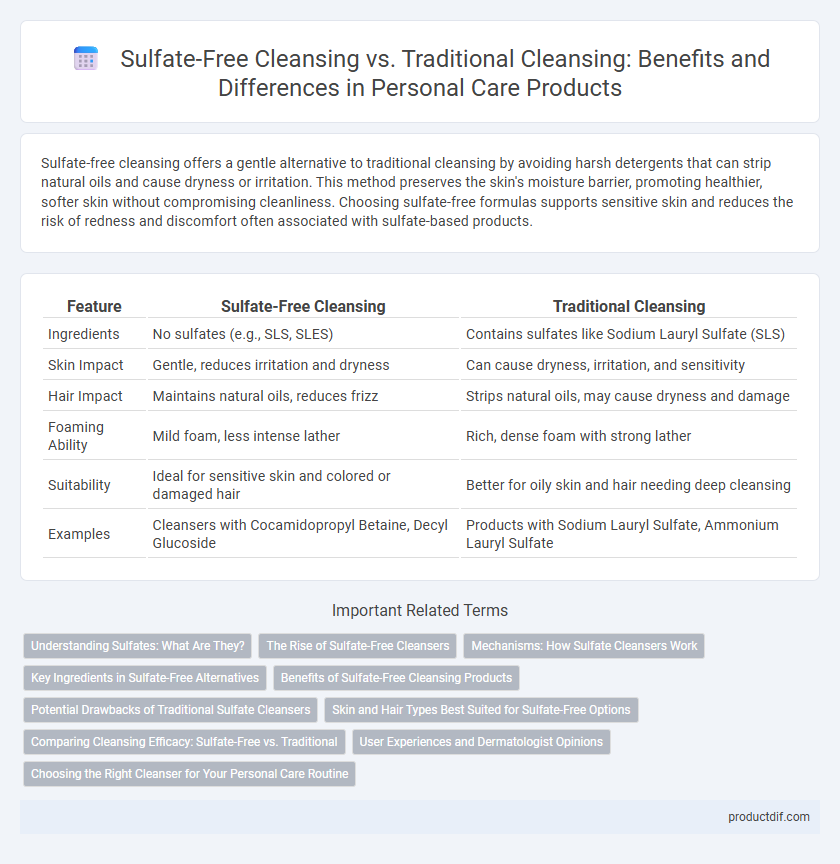Sulfate-free cleansing offers a gentle alternative to traditional cleansing by avoiding harsh detergents that can strip natural oils and cause dryness or irritation. This method preserves the skin's moisture barrier, promoting healthier, softer skin without compromising cleanliness. Choosing sulfate-free formulas supports sensitive skin and reduces the risk of redness and discomfort often associated with sulfate-based products.
Table of Comparison
| Feature | Sulfate-Free Cleansing | Traditional Cleansing |
|---|---|---|
| Ingredients | No sulfates (e.g., SLS, SLES) | Contains sulfates like Sodium Lauryl Sulfate (SLS) |
| Skin Impact | Gentle, reduces irritation and dryness | Can cause dryness, irritation, and sensitivity |
| Hair Impact | Maintains natural oils, reduces frizz | Strips natural oils, may cause dryness and damage |
| Foaming Ability | Mild foam, less intense lather | Rich, dense foam with strong lather |
| Suitability | Ideal for sensitive skin and colored or damaged hair | Better for oily skin and hair needing deep cleansing |
| Examples | Cleansers with Cocamidopropyl Betaine, Decyl Glucoside | Products with Sodium Lauryl Sulfate, Ammonium Lauryl Sulfate |
Understanding Sulfates: What Are They?
Sulfates are surfactants commonly used in traditional cleansing products to create lather and remove oils, dirt, and impurities from the skin and hair. These compounds, such as sodium lauryl sulfate (SLS) and sodium laureth sulfate (SLES), can sometimes strip natural oils, leading to dryness and irritation. Sulfate-free cleansing formulations prioritize gentle, non-irritating ingredients that maintain the skin's natural moisture barrier while still effectively cleansing.
The Rise of Sulfate-Free Cleansers
Sulfate-free cleansers have gained significant popularity due to their gentle formulation that effectively removes dirt and oil without stripping the skin's natural moisture barrier. Unlike traditional sulfate-based cleansers, which can cause dryness and irritation, sulfate-free products support healthier, balanced skin by using mild surfactants. This shift reflects increasing consumer demand for skincare solutions that prioritize hydration and sensitivity over harsh cleansing agents.
Mechanisms: How Sulfate Cleansers Work
Sulfate-free cleansers utilize mild surfactants derived from natural or synthetic sources to gently lift dirt and oils without stripping the skin's natural moisture barrier, preserving hydration and reducing irritation. These cleansers create fewer suds compared to traditional sulfate-based products, which rely on strong anionic surfactants like sodium lauryl sulfate to aggressively break down and emulsify fats and grime. By avoiding harsh sulfates, sulfate-free formulas maintain skin integrity and support a balanced microbiome while effectively cleansing impurities.
Key Ingredients in Sulfate-Free Alternatives
Sulfate-free cleansing formulations primarily utilize gentle surfactants such as cocamidopropyl betaine, decyl glucoside, and sodium cocoyl isethionate to effectively remove impurities without stripping natural oils. These key ingredients maintain the scalp's pH balance and minimize irritation, making them suitable for sensitive skin types. Unlike traditional sulfates like sodium lauryl sulfate, sulfate-free alternatives promote hydration and preserve the hair's natural moisture barrier.
Benefits of Sulfate-Free Cleansing Products
Sulfate-free cleansing products protect the skin's natural moisture barrier by gently removing dirt and oil without stripping essential oils, reducing dryness and irritation. These formulas maintain the skin's pH balance and minimize the risk of allergic reactions, making them ideal for sensitive and acne-prone skin types. By avoiding harsh sulfates, sulfate-free cleansers promote healthier, softer, and more hydrated skin over time.
Potential Drawbacks of Traditional Sulfate Cleansers
Traditional sulfate cleansers often contain harsh ingredients like sodium lauryl sulfate, which can strip natural oils and disrupt the skin's protective barrier, leading to dryness and irritation. These cleansers may also trigger sensitivity, redness, and exacerbate conditions such as eczema or rosacea. Long-term use of sulfate-based products can result in increased skin inflammation and compromised moisture retention.
Skin and Hair Types Best Suited for Sulfate-Free Options
Sulfate-free cleansing products are ideal for sensitive, dry, or color-treated skin and hair due to their gentle, non-stripping formulas that maintain natural oils and moisture balance. Individuals with curly, frizzy, or damaged hair benefit significantly from sulfate-free shampoos as these reduce irritation and preserve hair integrity. In contrast, traditional sulfate-based cleansers suit oily skin and hair types better by providing a more robust foam and deeper clean to remove excess sebum and buildup.
Comparing Cleansing Efficacy: Sulfate-Free vs. Traditional
Sulfate-free cleansers utilize mild surfactants derived from natural sources, effectively removing dirt and oils without stripping the skin's natural moisture barrier, unlike traditional sulfate-based cleansers which can cause dryness and irritation. Studies show sulfate-free formulas maintain skin hydration and support barrier function, making them ideal for sensitive or dry skin types, whereas traditional cleansers achieve rapid lather and deep cleansing but may lead to increased skin sensitivity. Consumer preferences are shifting towards sulfate-free options due to their balanced efficacy and gentler impact on skin health.
User Experiences and Dermatologist Opinions
Sulfate-free cleansing products are favored by many users for their gentle formulation that reduces skin irritation and dryness compared to traditional sulfate-based cleansers. Dermatologists often recommend sulfate-free options, especially for sensitive or eczema-prone skin, as they maintain the skin's natural moisture barrier without stripping essential oils. User feedback highlights improved skin texture and less redness, reinforcing dermatologist consensus on the benefits of sulfate-free cleansing for long-term skin health.
Choosing the Right Cleanser for Your Personal Care Routine
Sulfate-free cleansers use gentler surfactants that effectively remove dirt and oil without stripping the skin's natural moisture barrier, making them ideal for sensitive or dry skin types. Traditional cleansing products with sulfates like sodium lauryl sulfate provide a deep cleanse but can often cause irritation, dryness, and disruption of the skin's pH balance. Choosing the right cleanser involves considering your skin type, concerns, and sensitivity to ingredients, with sulfate-free options increasingly recommended for maintaining healthy, balanced skin in everyday personal care routines.
Sulfate-free cleansing vs traditional cleansing Infographic

 productdif.com
productdif.com